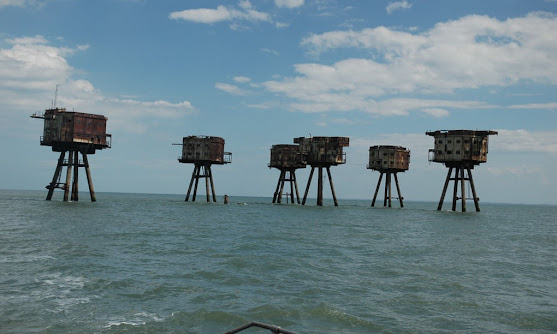Estuary (pronounced es-ture-ee or es-choo-er-ee)
(1) That part of the mouth or lower course of a river in which the river's current meets the sea's tide with a mixing of fresh and salt (tidal) water; an arm or inlet of the sea at the lower end of a river.
(2) By analogy when applied to religion, politics etc, where different tides of opinion intersect.
(3) In behavioral linguistics, as Estuary English, a variety of the English accent, spreading from London and containing features mostly of Received Pronunciation and Cockney.
1530–1540: From the Latin aestuārium (a tidal marsh, mudbeds covered by water at high tides; channel inland from the sea) from aestus (tide (a boiling of the sea; billowing movement; tide, heat)), the construct being aestus (tide) + ārium (place for) + -ary; the suffix –ary (of or pertaining to) was a back-formation from unary and similar, from the Latin adjectival suffixes -aris and -arius; appended to many words, often nouns, to make an adjective form and use was not restricted to words of Latin origin. The ultimate root was the primitive Indo-European aidh (to burn). Estuary was related is aestās (summer) and the adjectival forms are estuarial and estuarine (the latter dating from 1835, from estuary on model of marine. Tokyo, the capital city of Japan, was once called Edo (which translates literally as "estuary"). When the Tokugawa shogunate ended in 1868, the imperial capital in Kyoto (literally "western capital") was moved to Edo and renamed Tokyo (literally "eastern capital").
Estuary English
Despite a name which suggests a regional association, Estuary English (EE) is a modern variation of the English accent associated more with age and class distinctions although there remains a widespread perception it’s tied to the area along the River Thames and its estuary. Best imagined as Standard English spoken with some Cockney inflections, there’s no clear point where Cockney ends and Estuary English begins and in the early 1980s, it was suggested EE may eventually replace Received Pronunciation (RP) in the southeast, a linguistic shift which could take a century or more to realize. The word estuary was adopted as a descriptor to summon a picture of different strains of pronunciation mixing as salt and fresh water does at the estuary where river meets sea but has often, in popular use, been thought geographically associated with the Thames Estuary. In response to EE, scholars have suggested an alphabet soup of alternatives including LRGB (London Regional General British), PE (Popular English), PL (Popular London), LRS (London Regional Standard), HCMDA (Home Counties Modern Dialect) and SERS (South-Eastern Regional Standard). None caught on and PL had anyway earlier been used as an alternative to Cockney itself.
Was it Estuary English? At the subreddit r/askUK, redditors conducted an untypically genteel discussion about Lindsay Lohan's British accent in The Parent Trap (1998).
EE is (1) not specifically geographic within the south-east, (2) is a blend rather than containing any new elements, (3) should be thought a lower middle-class (rather than working-class) accent and (4), has spread upward in the middle-class to the point where EE is now an accepted alternative to RP, even for those in public life. Regarding EE’s sometime cynical adoption by those expected to use RP, the derisive term is mockney. Within the linguistics community EE is on a sociolinguistic and geographical continuum between RP and Cockney, spreading not because it’s a collection of coherent structures and objects but because it’s “…neither the standard nor the extreme non-standard poles of the continuum". Implicit in that is that EE will continue to evolve, unlike RP or Cockney, both of which are documented, standardized forms.
Sea (Maunsell) Forts built in the Thames estuary during World War II as naval gun platforms and observation stations. Decommissioned in 1958, they were used in the 1960s as one of the platforms from which pirate radio stations broadcast. One of the forts has since 1967 been managed by the (internationally unrecognized) Principality of Sealand.


No comments:
Post a Comment